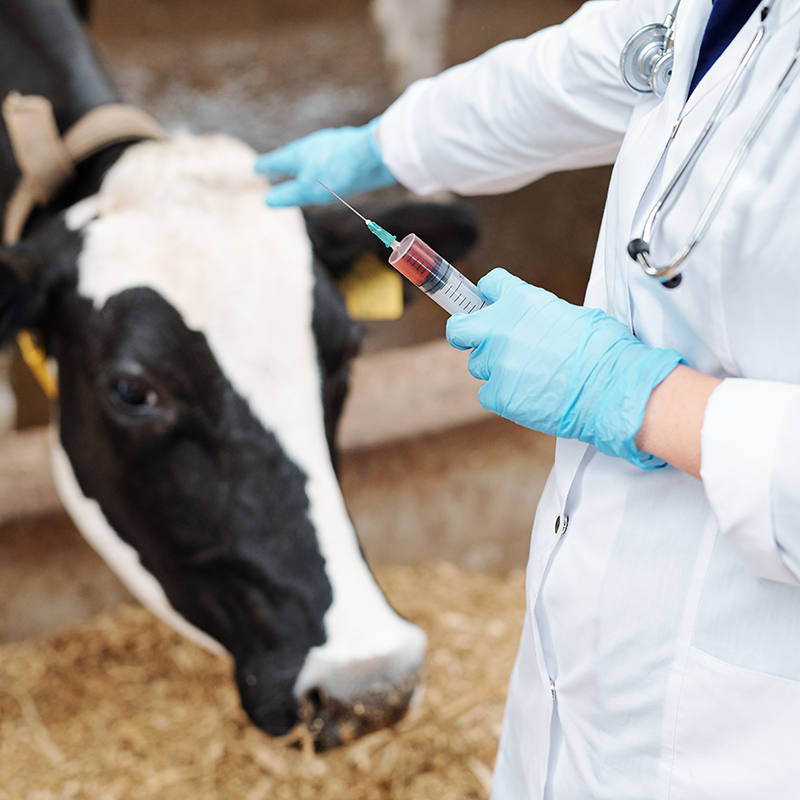Revolutionising animal vaccines: ArkVax's affordable solution
Vaccines represent a highly cost-effective, efficacious intervention to control and prevent the spread of disease in humans and animals.
In animals, vaccination:
- enhances welfare and improves the productivity of treated animals to meet global food security
- ensures food safety and supports people’s livelihoods
- safeguards public health, including playing a key role in preventing or reducing the risk of spillover of zoonotic diseases and antimicrobial resistance to humans
As the health of livestock is intimately connected to the health of people, the development of veterinary vaccines is an important tool in a unified One Health approach to nutrition security.
ArkVax, a spin-out co-founded in 2020 by Professor Brendan Wren and Dr Jon Cuccui from the London School of Hygiene and Tropical Medicine (LSHTM), produces vaccines with a focus on livestock diseases. BBSRC funding has been key, supporting initial exploration through to commercialisation.
Professor Wren received his first BBSRC grant in 1995 for investigating the bacteria Campylobacter jejuni. By exploring the bacteria’s genes and proteins, he identified the production of proteins with sugar attachments, known as glycoproteins.
BBSRC Responsive Mode funding supported Professor Wren in transferring the ability to produce glycoproteins to another, more lab-appropriate bacteria. This opened the doors for a new method of glycoengineering called Protein Glycan Coupling Technology (PGCT), primarily used to produce glycoconjugate vaccines.
These vaccines are effective but expensive to make using traditional methods, so use in animals had previously been cost-prohibitive. The quicker and cheaper PGCT glycoconjugate vaccine production method opened this avenue.
The Wren group have been developing animal vaccines using PGCT since 2010 with support from BBSRC through sLoLa grants, Follow-on Funds, and Responsive Mode funding. Dr Cuccui received a BBSRC-funded Enterprise Fellowship in 2017 to build the business knowledge needed for a successful company. This, alongside support from Babraham Research Campus through its Accelerate@Babraham programme, was key to the development of ArkVax.
About BBSRC
As the UK’s major public funder of world-leading bioscience research and innovation, the Biotechnology and Biological Sciences Research Council's (BBSRC) vision is to advance the frontiers of biology and drive towards a healthy, prosperous and sustainable future.
Some of the institutions key to meeting this vision are BBSRC’s strategic partnerships with universities, of which there are 15. Also mission critical are the 8 specialist bioscience research institutes that BBSRC strategically funds:
- Babraham Institute
- Earlham Institute
- Institute of Biological, Environmental and Rural Sciences (IBERS)
- John Innes Centre
- The Pirbright Institute
- Quadram Institute
- The Roslin Institute
- Rothamsted Research
Find out more about BBSRC’s work and strategic priorities by reading our Strategic Delivery Plan 2022-2025.
Contact us
Impact narratives and case studies provide an important evidence base to support the case for continued investment in world-class bioscience.
Get in touch with us to discuss BBSRC’s research outcomes and impacts or to tell us about your own:
Emma Lambourne, Senior Manager, Impact Evidence
emma.lambourne@bbsrc.ukri.org
Rosie Ford, Manager, Impact Evidence
rosie.ford@bbsrc.ukri.org
Dr Beverley Thomas, Associate Director, Evidence and Evaluation
beverley.thomas@bbsrc.ukri.org
Biotechnology and Biological Sciences Research Council
UK Research and Innovation, Polaris House, Swindon, SN2 1FL

